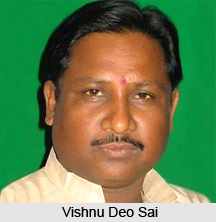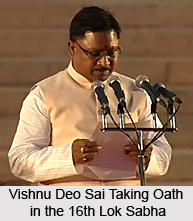 Vishnu Deo Sai is a noted Indian politician serving as the Minister of State for Mines, Steel and Labour and Employment in the Government of the 15th Prime Minister of India, Narendra Modi in the 16th Lok Sabha. As a member of the Indian political party Bharatiya Janata Party (BJP) he is the representative of the Raigarh constituency of the Indian state Chhattisgarh. Since the year 1999 Vishnu Deo Sai has been a Lok Sabha member. He is also the lone representative of Chhattisgarh in the 16th Lok Sabha. For two consecutive terms he has been the member of Madhya Pradesh Assembly, before the formation of Chhattisgarh state. He is also known for serving the people of scheduled castes and scheduled tribes and is concerned about the treatment of sick people.
Vishnu Deo Sai is a noted Indian politician serving as the Minister of State for Mines, Steel and Labour and Employment in the Government of the 15th Prime Minister of India, Narendra Modi in the 16th Lok Sabha. As a member of the Indian political party Bharatiya Janata Party (BJP) he is the representative of the Raigarh constituency of the Indian state Chhattisgarh. Since the year 1999 Vishnu Deo Sai has been a Lok Sabha member. He is also the lone representative of Chhattisgarh in the 16th Lok Sabha. For two consecutive terms he has been the member of Madhya Pradesh Assembly, before the formation of Chhattisgarh state. He is also known for serving the people of scheduled castes and scheduled tribes and is concerned about the treatment of sick people.
Early Life of Vishnu Deo Sai
Vishnu Deo Sai was born on 21st February 1964 in a village called Bagia located in the Jashpur district of the central Indian state Chhattisgarh to Shri Ram Prasad Sai and Smt. Jashmani Devi. He completed his schooling from Loyola Higher Secondary School in Jashpur.

Political Career of Vishnu Deo Sai
Vishnu Deo Sai began his political career from his village when he got elected as the Sarpanch, unopposed. His potentials were further explored by the former Union Minister late Dilip Singh Judeo who encouraged his name for contesting the assembly poll from Tapkara (presently a deleted constituency) in the year 1990. For the period between 1990 and 1998 he became the member of Madhya Pradesh Legislative Assembly which included two terms. In the year 1999 he was elected to the 13th Lok Sabha and from 1999 to 2000 he served as the member of the Committee on Absence of Members from the sittings of the House and Committee on Food, Civil Supplies and Public Distribution. From 2000 to 2004 he was the member of the Consultative Committee under the Ministry of Agriculture. In the year 2004 he once again got elected to the 14th Lok Sabha and also became the member of the Committee on Information Technology. On 5th August 2007 he was designated as the member of the Committee on Water Resources. In 2009 he was re-elected to the 15th Lok Sabha and on 31st August of 2009 he became a member of the Committee on Commerce.
Personal Life of Vishnu Deo Sai
Vishnu Deo Sai is married to Smt. Kaushalya Devi since 27th May 1991 and the couple has a son and two daughters.




















